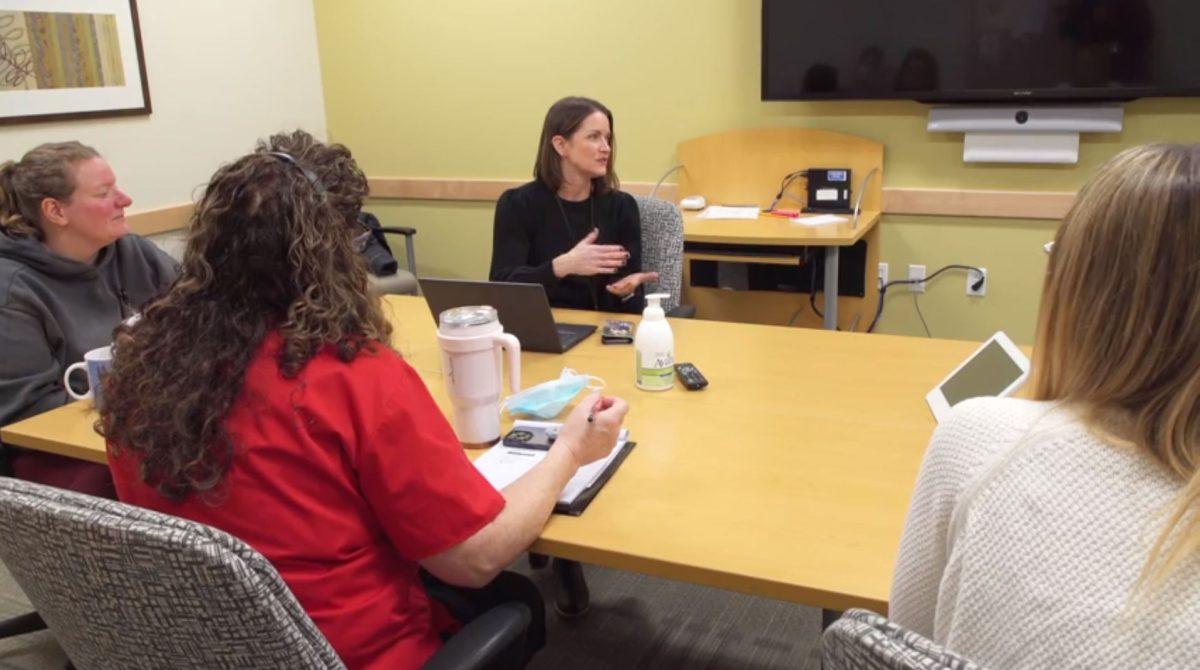Content warning: This story contains mention of addiction, drug use and overdose. Recovery from addiction is possible. For help, please call the confidential referral hotline, 1-800-622-HELP, or view options on campus through University Health Services.
The University of Wisconsin Health Compass Program is a new walk-in clinic that aims to remove access barriers for those seeking support for opioid use disorder and related health concerns. Located at 1102 S. Park Street, the clinic provides high-quality care that meets individualized needs even for those without health insurance.
Addiction medicine physician at UW Health Dr. Elizabeth Salisbury-Afshar recognized a gap in the healthcare system where patients with substance use disorder were unable to access care due to social barriers and trouble navigating services. Having a background in public health, she became interested in how social factors impact health care and what mechanisms could influence them.
“I’ve always been really interested in treatment models that work hard to meet patient’s needs who may struggle with things like transportation or housing,” Salisbury-Afshar said. “There are lots of other social factors that make it hard for them to engage in a traditional health care system.”
As director of the Compass Program, Salisbury-Afshar oversees a central location where patients can receive individualized, holistic care and connect with community and healthcare resources.
Physician Assistant at the clinic Maggie Williams said the grant from the Department of Health Services was critical for opening a clinic like this one.
Madison Chapter of GWIS commits to reducing gender disparities
“One thing that sets us apart is just being able to see uninsured patients in an outpatient setting, and not having to have them worry about that financial burden,” Williams said.
According to Salisbury-Afshar, the grant funding allows the Compass Program to provide patients with financial assistance to cover the cost of clinics, some laboratory tests and medicines. To relieve navigational challenges, the clinic helps patients apply for health insurance, find peer mentorship and connect with case management resources.
The Wisconsin Department of Health Services reported that in 2022, there were 100 inpatient hospital and 321 opioid-related emergency room visits in Dane County.
Clinics and hospitals can be limited in their ability to address social determinants of health, such as healthcare accessibility which can be impacted by an individual’s transportation and insurance status. But now, providers can refer patients to the clinic where they can gain holistic support for substance-related needs, Salisbury-Afshar said.
In addition to access barriers, people with SUD may experience the co-occurrence of other health-associated issues. According to a study from the Harm Reduction Journal, a nationally representative sample of women with a history of SUD reported a 70% increased likelihood of unintended pregnancy compared to non-drug users.
https://badgerherald.com/news/2024/03/05/study-finds-having-purpose-in-life-may-increase-emotional-resilience-longevity/
Salisbury-Afshar said the team uses evidence-based care and aims to be responsive to what they hear people need from their community partners.
“We’ve been hearing that sometimes folks who have wounds from their injected drug use feel stigmatized in other healthcare environments,” Salisbury-Afshar said.
The Compass Program offers additional services for frequent co-occurring health needs such as basic wound care, vaccinations, hepatitis screening and treatment and sexual health services. According to Williams, the patient-centered focus means care plans will vary, but the clinic can connect patients to long-term solutions after meeting their immediate needs.
“We can serve as a point of contact to connect [patients] to services within UW Health and the greater community which can improve not only their outcomes for SUD but also their health overall,” Williams said.
Other recent local initiatives have been implemented to address SUD. At the beginning of the month, the Madison Fire Department began carrying buprenorphine — one of three FDA-approved medications to treat opioid dependence and a drug the Compass Program administers. In addition to buprenorphine (Suboxone), the Compass Program offers extended-release buprenorphine (Sublocade) and extended-release naltrexone (Vivitrol), which can be used to treat opioid use disorder.
UW researcher presents research on supporting Native communities through water research
After responding to the overdose with Narcan, the MFD can now offer buprenorphine as a first step to comprehensive recovery and follow up with the overdose survivor on where they can seek ongoing care, Salisbury-Afshar said.
Buprenorphine decreases acute opioid withdrawal symptoms, according to the Substance Abuse and Mental Health Services Administration and has been shown to increase treatment retention, reduce the risk of relapse and reduce the risk of death by overdose when taken consistently.
As the Compass Program continues to develop, its future will depend on the changing needs of the community and the resources they can pull together. The team will continue to build relationships and look for resources to help them best support their patients, Williams said.
The clinic is currently open Tuesdays and Fridays and sees patients between 8:30 a.m. and 4:00 p.m., offering an open-access model where patients are seen on a first-come, first-serve basis. The clinic can see patients quickly, but Salisbury-Afshar encourages new patients to come earlier in the day.
The clinic can be contacted for health care needs at (608) 282-8270. Urgent needs will be addressed immediately and others will be responded to during program hours. A UW Health stall member will respond after hours and on weekends and interpreter services are available at no cost.
In the event of an emergency, call 911.
Additional recovery resources:
- National Overdose Prevention Lifeline: 1-800-484-3731
- Safe Communities 24/7 Recovery Hotline: 608-228-1278
- University Health Services 24-hour crisis intervention: 608-265-5600
- Wisconsin Addiction Recovery Hotline: 211
- Badger Recovery, a program for students in or considering recovery from substance use: [email protected]
- Behavioral Health Resource Center of Dane County for treatment and recovery resources: 608-267-2244
- Connections Counseling: 608-233-2100, connectionscounseling.com
- Other campus recovery resources: alcoholanddruginfo.students.wisc.edu/resources












